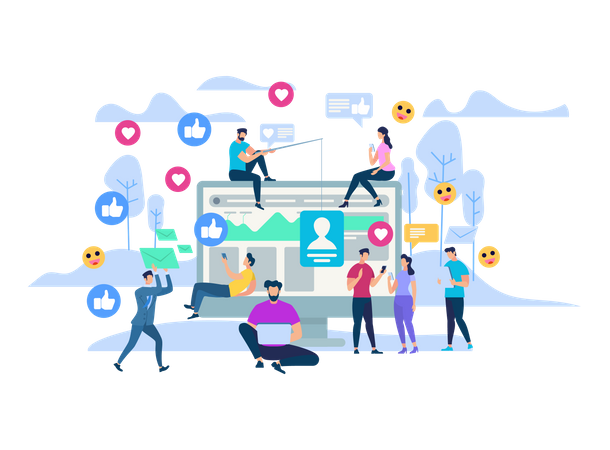
Where Are All the Likes Coming From? The Business Behind Buying Social Media Engagement
The Mechanics of Buying Likes
In the age of social media, visibility and engagement are paramount. The number of likes, comments, and followers a profile garners can significantly impact one's online presence and perceived influence. This has given rise to a burgeoning industry: the sale of likes and followers. But where do these likes actually come from? Understanding this phenomenon requires a deep dive into the mechanics behind bought social media engagement.

Buying likes is a straightforward process. Numerous websites and services offer packages where users can purchase a set number of likes, followers, or comments. These services promise quick delivery and often guarantee "real" engagement. But the reality behind these transactions is more complex.

Bot Accounts: The most common source of purchased likes is automated accounts, or bots. These are fake profiles created specifically for boosting numbers. Bots can be easily mass-produced and programmed to follow, like, or comment on command. While they can inflate numbers, they offer no real engagement or value since they are not operated by actual users.

Click Farms: Click farms are another major source. Located primarily in countries with low labor costs, click farms employ workers to manually create fake accounts and engage with content. Workers in these farms are often paid minimal wages to spend hours liking, following, and commenting on various social media platforms. This method is more expensive than bots but can sometimes evade detection due to the human element involved.

Engagement Pods: Engagement pods are groups of real users who agree to like and comment on each other’s posts. These pods can be informal groups of friends or organized networks where members follow strict engagement rules. While not inherently fake, this mutual agreement skews natural engagement metrics.

Advertisment Campange: Engagement pods are groups of real users who agree to like and comment on each other’s posts. These pods can be informal groups of friends or organized networks where members follow strict engagement rules. While not inherently fake, this mutual agreement skews natural engagement metrics.
The Ethical and Practical Implications
The practice of buying likes raises significant ethical questions. It distorts the social media landscape, undermines trust, and can lead to deceptive marketing practices. When influencers or brands buy likes, they misrepresent their reach and influence, which can deceive followers and potential business partners.
Moreover, social media platforms are continuously improving their algorithms to detect and penalize fake engagement. Accounts identified as using bought likes can be shadowbanned, suspended, or permanently banned. This risk is particularly high for accounts heavily reliant on bot-generated likes, which are easier to detect due to their patterns and behaviors.

The drive to purchase likes is often fueled by the psychological impact of social validation. High numbers of likes can boost an individual's or a brand's confidence and perceived popularity. In a competitive digital landscape, the pressure to appear successful and influential can be immense, pushing many to seek quick fixes like buying engagement.
- Compromised Accounts: Some services exploit real user accounts. These can be accounts that have been hacked or otherwise compromised, or they can be part of networks where users have unwittingly given consent to use their accounts for such purposes. This method uses real profiles, making the likes appear more authentic.
- Engagement Pods: Engagement pods are groups of real users who agree to like and comment on each other’s posts. These pods can be informal groups of friends or organized networks where members follow strict engagement rules. While not inherently fake, this mutual agreement skews natural engagement metrics.
The Ethical and Practical Implications
The practice of buying likes raises significant ethical questions. It distorts the social media landscape, undermines trust, and can lead to deceptive marketing practices. When influencers or brands buy likes, they misrepresent their reach and influence, which can deceive followers and potential business partners.
Moreover, social media platforms are continuously improving their algorithms to detect and penalize fake engagement. Accounts identified as using bought likes can be shadowbanned, suspended, or permanently banned. This risk is particularly high for accounts heavily reliant on bot-generated likes, which are easier to detect due to their patterns and behaviors.
The Psychological Aspect
The drive to purchase likes is often fueled by the psychological impact of social validation. High numbers of likes can boost an individual's or a brand's confidence and perceived popularity. In a competitive digital landscape, the pressure to appear successful and influential can be immense, pushing many to seek quick fixes like buying engagement.
Alternatives to Buying Likes
While the allure of instant popularity is tempting, there are more sustainable and ethical ways to grow a social media presence:
- Authentic Content Creation: Focusing on high-quality, engaging content that resonates with the target audience.
- Organic Growth Strategies: Using legitimate marketing techniques like SEO, collaborations, and promotions to attract genuine followers.
- Community Building: Engaging with followers genuinely, responding to comments, and creating a sense of community.
- Data Analytics: Utilizing social media analytics to understand what content works best and iterating based on performance metrics.
Conclusion
The industry of buying likes is a complex web of automated bots, click farms, compromised accounts, and engagement pods. While it offers a shortcut to apparent popularity, the ethical implications and risks involved make it a precarious choice. Building an authentic, engaged following through genuine interactions and quality content remains the most effective strategy for long-term success on social media platforms.
